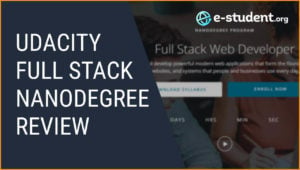Consumers are to a large – and increasing – degree using their mobile devices rather than desktop or laptop computers. Unsurprisingly, mobile app development also keeps growing in importance as a career specialization for developers.
Among the mobile operating systems, Apple’s iOS (that you find on iPhones and iPads) makes up around 30% of the market, with the rest primarily taken up by Android users. However, if you think that this means that you should reconsider your plans and focus on developing for Android instead, think again; iOS users are much heavier spenders, with 63% of app revenue in 2021 coming from iOS.
Whether you’re looking to get a job at an existing company as an iOS developer or if you’ve got an app idea that you would like to develop yourself, taking an online course in iOS development is a great way to get started. This is where Meta’s recently launched iOS Developer Professional Certificate on Coursera comes in. This program is designed to help beginners learn to make iOS apps, including design, linking parts, and getting them on the App Store. When you finish, you should be sufficiently proficient at iOS programming to find jobs through Meta’s Career Programs.
This ambition, coming from one of the largest tech firms out there, piqued our interest, and I wanted to try this out to see whether it lived up to its promise. Having gone through the program, You’ll find my experience and recommendations below.
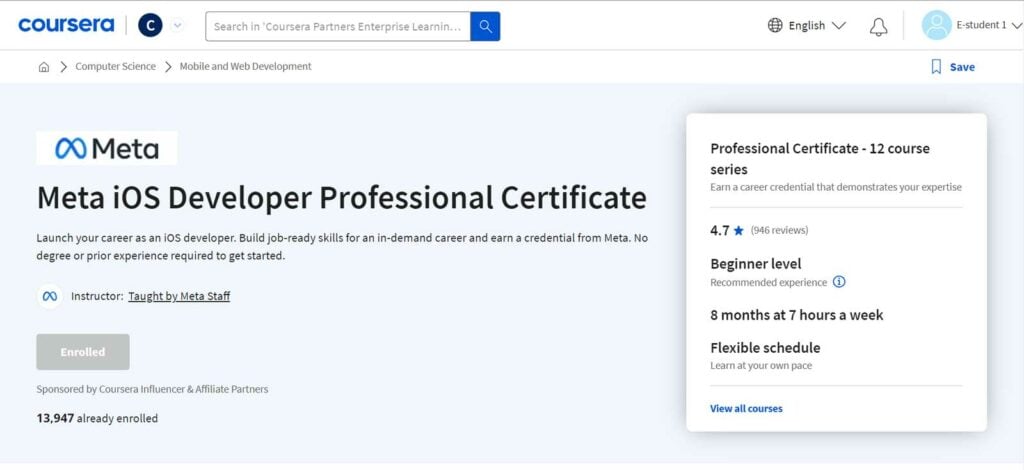
Table of Contents
Overview of the Meta iOS Developer Professional Certificate
This professional certificate is designed for beginners, without requiring any previous experience or degree to enroll. The syllabus covers a wide range of topics, from the basics of iOS development to more complex areas like data storage, networking, and testing. For newbies, I find the content appears to be well-suited for providing a solid iOS foundation. The instructors leading the course are industry professionals making it such a good option for beginners to enroll in iOS development.
The course takes about eight months if you dedicate 7 hours a week, but you can learn at your own pace. Each course has 3-4 weeks of content, including videos, readings, quizzes, and assignments. While I had access to the full program for this review, you can also audit any course if you’re on a budget or want to try before buying (although you won’t be able to access all assignments or receive a certificate upon completion).
Course instructors
The Meta iOS Developer Professional Certificate is taught by developers from Meta’s team who specialize in iOS development, application development, and data science. These instructors bring their industry experience into the course, aiming to align the content with current trends and practices. The focus is on practical insights and hands-on knowledge, reflecting the instructors’ professional backgrounds.
Alternatives and complements to this Certificate
While the Meta iOS Developer Professional Certificate serves as a robust introduction to iOS development, there are other educational paths that might align more closely with individual needs and goals. For those seeking a more affordable comprehensive course, a better option could be iOS & Swift – The Complete iOS App Development Bootcamp on Udemy, offering a journey from beginner to professional, including a dedicated module on SwiftUI. For absolute beginners, Become an iOS Developer from Scratch on Udemy is recommended if you have no prior coding experience. Moreover, if you would like a quick introduction to Swift programming, then the free Intro to iOS App Development with Swift by Udacity might be a good choice.
Is the Meta iOS Developer Professional Certificate worth the cost?
The Meta iOS Developer Professional Certificate program on Coursera requires the completion of 13 courses and a capstone project, taking around 8 months at a study pace of 7 hours per week. For those who are planning to enroll, it operates on a subscription plan costing $49 per month, totaling $392 for the entire duration. While the program isn’t free, the cost covers access to the course materials and projects, culminating in a Meta certification. The production quality of the course is commendable, with clear audio and video. The content is delivered in a manner that’s easy to follow, and the exercises are thoughtfully crafted, providing opportunities for hands-on practice and immediate feedback.
All of these things together give good value for what’s paid, especially if someone is serious about becoming a skilled iOS developer.
Keep in mind that this Professional Certificate is separate from Coursera Plus subscriptions and requires payment. If someone is looking to save money, the program can be finished in less than the recommended time of eight months since it’s self-paced. As for most Coursera courses, it is also possible to audit the individual courses of the Professional Certificate for free. Coursera also provides a 7-day free trial as well, which allows a review of the course material before committing to a paid plan.
Detailed review
Syllabus overview
The Meta iOS Developer Professional Certificate is divided into 12 modules, each honing in on a different element of the development process, such as Swift basics, user interface design, data management, networking, and testing. It is recommended to take the courses in the listed order to build on concepts taught in previous courses.
- Introduction to iOS Mobile Application Development
- Version Control
- Programming Fundamentals in Swift
- Principles of UX/UI Design
- Create the User Interface with SwiftUI
- Advanced Programming in Swift
- Working with Data in iOS
- Mobile Development and JavaScript
- React Basics
- React Native
- iOS App Capstone
- Coding Interview Preparation
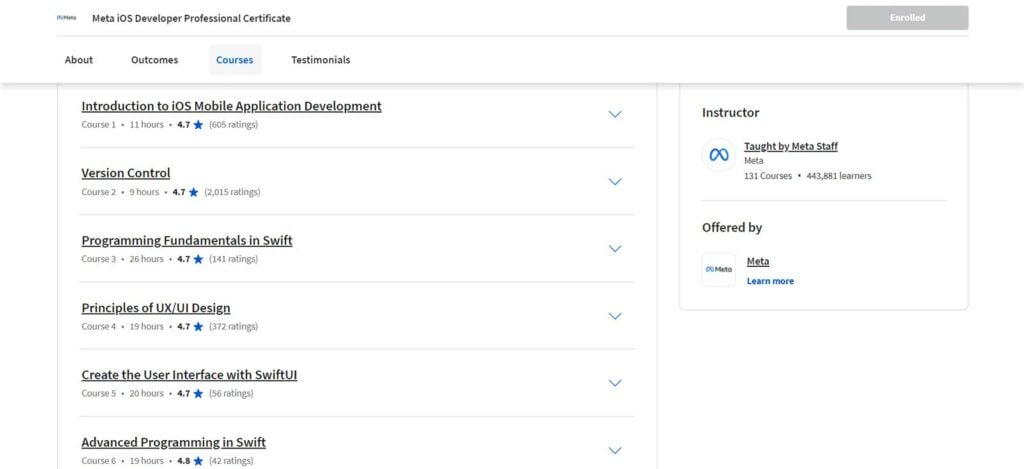
Course 1: Introduction to iOS Mobile Application Development
The Meta iOS Developer Professional Certificate program’s introductory course on iOS Mobile Application Development is a well-structured and beginner-friendly course that offers an in-depth exploration of iOS development. Comprising three modules, the course takes learners on a journey through the iOS ecosystem, starting with the basics of the OS and the development platform.
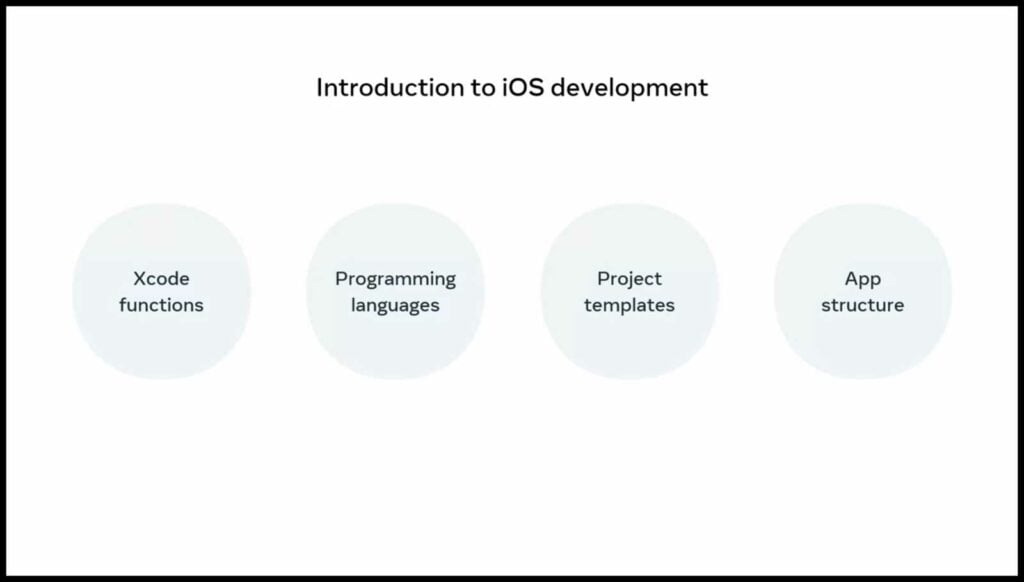
The first thing that caught my attention was the course’s emphasis on practical application. Already from the start, it’s not just about theory; learners get to engage with real-world projects and exercises, writing code in Swift and manipulating data. The use of Swift playgrounds for writing code and creating UI is a hands-on approach that I found particularly engaging. The course also provides a solid foundation in mobile development tools, including XCode, Objective-C, UI frameworks, Testflight, UI storyboard, MVC, and APIs. The ability to set up and explore the XCode environment and understand its use in the Swift app development process is a valuable skill that this course imparts. I appreciated the mathematical underpinning provided through algebra and computer programming skills, which adds depth and prepares students for more advanced studies. The quizzes and exercises are well-structured, reinforcing the learning material without being overly complex. This balance ensures that the learning process is challenging yet accessible, even for those new to programming.
The course offers a well-rounded introduction without overwhelming the beginner, focusing on practical skills and providing a robust understanding of the tools and software essential for iOS development. Whether you’re new to programming or looking to specialize in iOS, this course offers valuable insights and hands-on experience that can set you on the right path.
Course 2: Version Control
The Version Control course offers an introduction to the world of version control systems, tailored specifically for beginners. The course is more than just a theoretical overview; it’s a hands-on exploration of how modern software developers collaborate without conflicting with each other’s code.
The course is divided into four modules, each focusing on different aspects of version control. The first module introduces the concept of collaboration across the world, highlighting the importance of version control systems in creating an effective software development workflow. The second module delves into Linux commands, providing practical knowledge on how to work with files and create powerful, time-saving workflows.
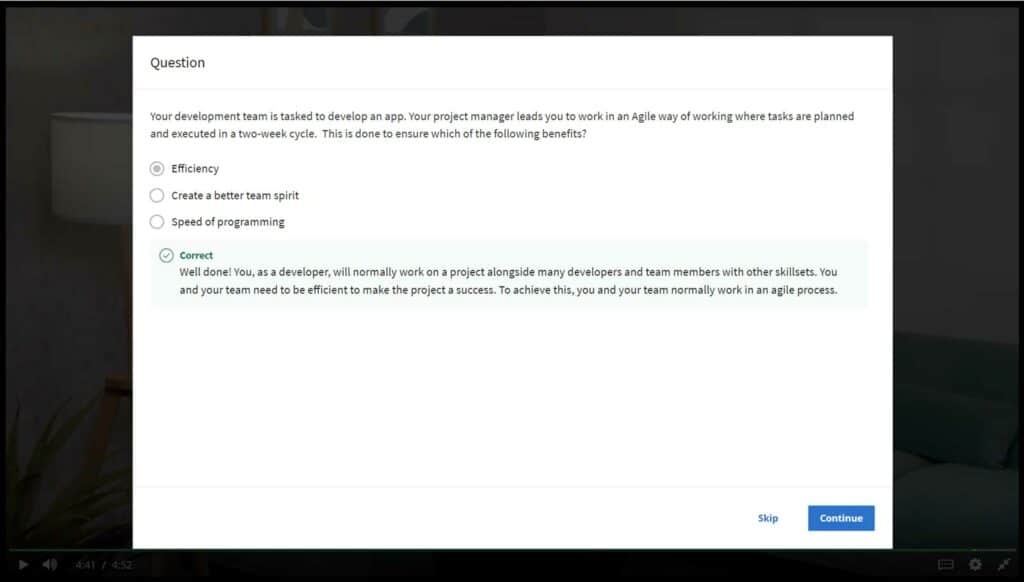
The latter part of the course focuses on Git, a widely used version control system, teaching how it can be used in software development projects to manage team files. The final module allows students to create a repository that can manage code revisions, providing a tangible understanding of the subject matter.
Course 3: Programming Fundamentals in Swift
This is a beginner-level course that offers a comprehensive understanding of general programming principles in Swift. As a beginner in iOS myself, I found the course’s detailed structure quite appealing. It starts with the very basics and gradually builds up to more complex concepts, making the learning curve smooth and manageable.
The course is divided into five modules, each focusing on different aspects of Swift programming. I particularly enjoyed the hands-on practice with constants, variables, and data types. The exercises and quizzes were well-designed, providing ample opportunities to reinforce what I had learned. I also appreciated the emphasis on data structures, which helped me understand the fundamentals of efficient programming. One of the highlights for me was the course’s ability to bridge the gap between practical coding and theoretical principles. It’s not just about writing code; it’s about understanding the underlying concepts that make the code work. By the end of the course, I felt confident in my ability to declare and modify constants and variables, differentiate between different types of operators, and create simple control flow patterns using Swift.
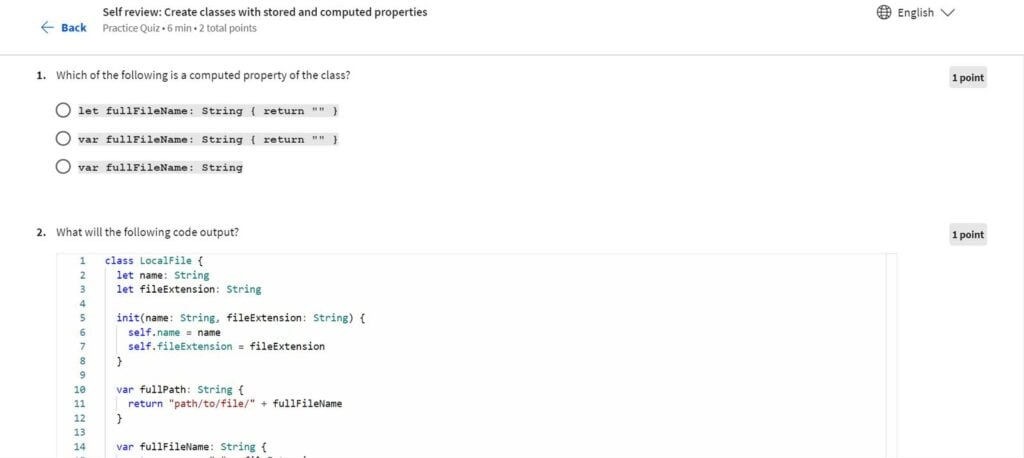
What’s great about this course is that you don’t need any prior web development experience to succeed. All you need is basic internet navigation skills and a genuine eagerness to learn coding. As someone looking to prepare for a career in iOS development, I found this course to be a valuable stepping stone. So, if you’re a beginner eager to dive into the world of Swift programming, this course could be an ideal choice, and the progression from basic to advanced concepts makes it a worthwhile investment for those starting their journey in iOS development.
Course 4: Principles of UX/UI Design
The Principles of UX/UI Design course is a beginner-level course aimed at providing a comprehensive understanding of the fundamentals of User Experience (UX) design and research, accessibility considerations in design, user empathy development, and wireframing and prototyping in Figma. The course’s focus on both theoretical principles and practical application sets it apart. The inclusion of user empathy as a core concept sets this course apart, emphasizing the human-centered approach that is vital in UX/UI design. The exercises and quizzes regarding the use of Figma are quite engaging and add a real-world tool experience. Not only that, but it also allows for a deeper exploration of UX/UI principles, ensuring that learners grasp the nuances of design thinking and user-centered design. One area where the course could improve is by offering more case studies and real-world examples, providing learners with insights into how these principles are applied in various industries.
Course 5: Create the User Interface with SwiftUI
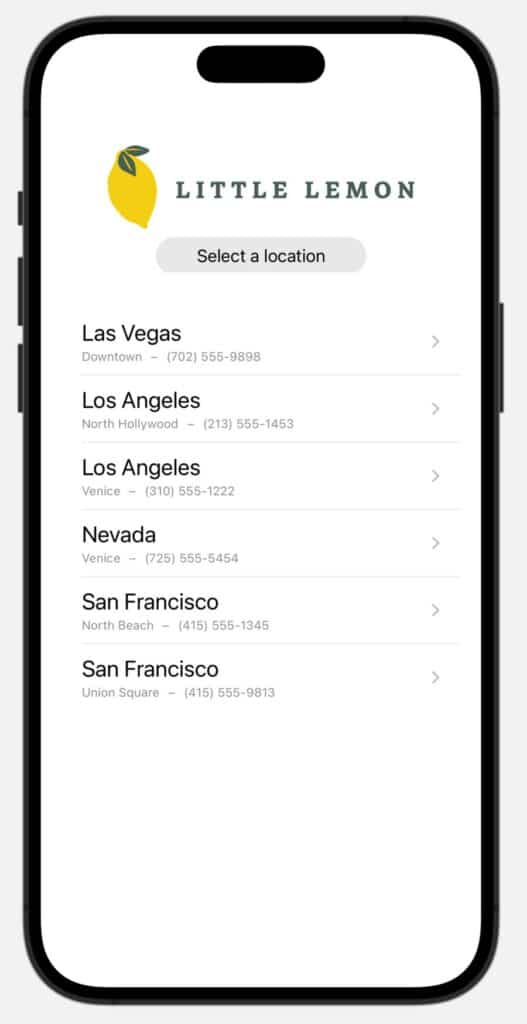
This course is designed to teach learners how to create user interfaces (UI) for mobile apps using SwiftUI, focusing on UI development, mobile app development, UI interactivity, and project development. The course is well-structured, with a clear progression from basic to more advanced concepts. The hands-on approach, with exercises and quizzes that allow learners to create actual UI components, adds significant value to the learning experience. The course’s focus on SwiftUI ensures that learners are working with the latest technology, preparing them for real-world iOS development.
The inclusion of both iOS and Android development skills provides a broader perspective, although the primary focus remains on iOS. One of the highlights of this course is its emphasis on interactivity, teaching learners how to create dynamic and engaging user interfaces. The course’s duration is suitable for a comprehensive understanding without overwhelming beginners.
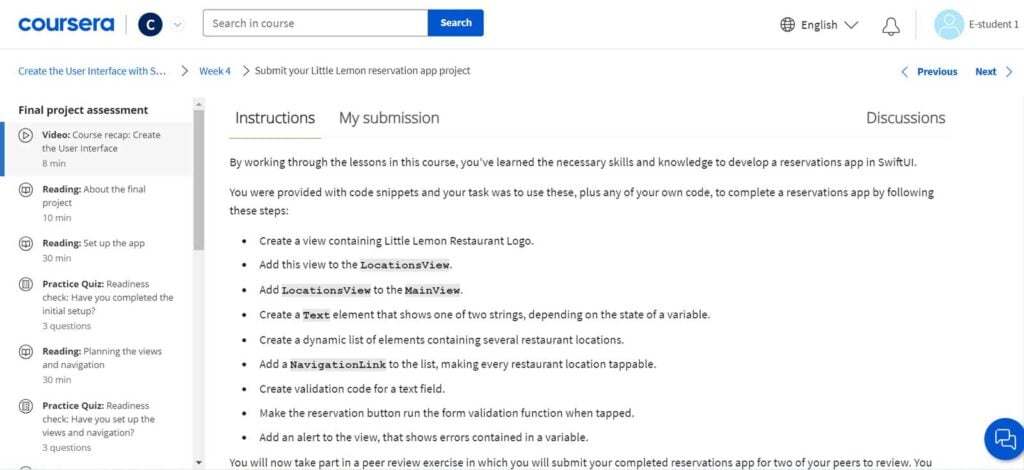
Nonetheless, some learners might benefit from more in-depth explanations of certain concepts, especially if they are entirely new to UI development. It also offers a solid introduction to UI development with SwiftUI, equipping learners with the skills needed to create visually appealing and interactive mobile apps.
Course 6: Advanced Programming in Swift
The Advanced Programming in Swift course is an intermediate-level offering that aims to deepen the learner’s understanding of Swift programming, particularly focusing on implementing iOS applications with search and filtering capabilities. The course is divided into four modules, each designed to build on the previous one, providing a clear progression from basic to more complex concepts.
The ideal audience for this course is clearly defined: intermediate learners looking to prepare for a career in iOS development. The prerequisites are also clearly stated, ensuring that potential students know what foundational knowledge is expected of them. This transparency helps to set clear expectations and ensures that learners are well-matched to the course’s content and difficulty level.
What struck me about this course was its comprehensive approach to teaching Swift’s advanced custom data types, code organization best practices, error handling, and functional programming techniques like higher-order functions (map, filter, reduce). The course’s focus on real-world application is further emphasized through the exercises that guide learners in creating functionalities often encountered in apps with large lists of items. This practical approach not only reinforces the theoretical concepts taught but also provides a glimpse into the day-to-day tasks of a professional iOS developer. One aspect that I found particularly appealing was the course’s attention to error handling. By teaching learners how to employ appropriate error-handling approaches, implement throwable functions, and catch errors, the course ensures that students are well-equipped to write robust and resilient code. This focus on error handling is not always given due attention in programming courses, and its inclusion here adds an extra layer of sophistication.
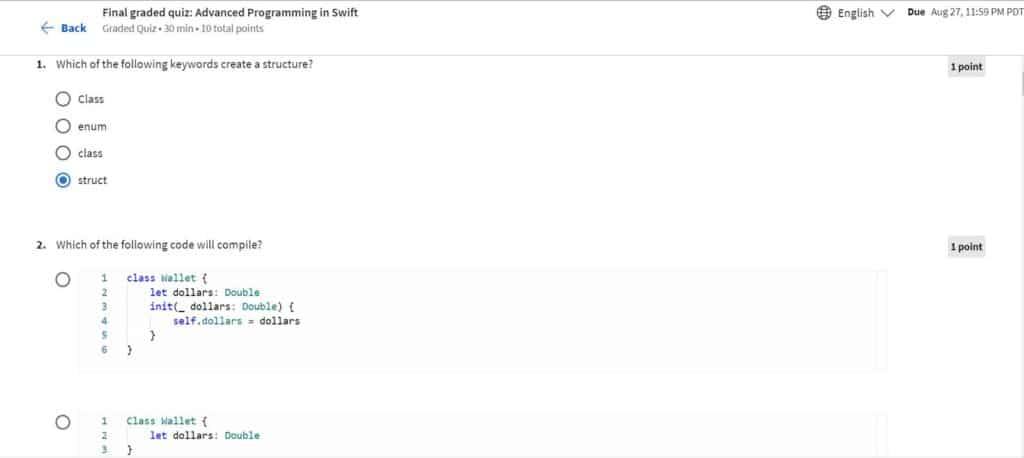
The course also delves into more advanced programming concepts like recursion and the implementation of higher-order functions like map, filter, and reduce. These topics can be complex, but the course handles them with clarity, making them accessible to those with an intermediate understanding of Swift.
Course 7: Working with Data in iOS
The course for working with data in iOS is a well-structured and comprehensive offering that explores the core principles of managing data within the iOS environment. It is an intermediate level course so you should have an advanced understanding of Swift programming and a functional knowledge of APIs. This prerequisite knowledge ensures that learners are well-prepared to engage with the course material fully. However, it is designed with a clear focus on the processes and concepts behind APIs, data formats, communication over the web, and working with Core Data in Swift.
One of the aspects of this course is its emphasis on data management, a fundamental concept in iOS development. The course doesn’t just skim the surface; it dives deep into the subject, reflecting the essential skills that every iOS developer needs. It is divided into four modules, each building on the previous one, guiding learners through the complexities of working with data in iOS. From exploring data formats that enable data transfer between servers and devices to hands-on practice with Core Data in Swift, the course is thorough and engaging.
By the end of the course, learners are expected to demonstrate a working knowledge of how Swift applications communicate over the web, apply asynchronous programming techniques using Swift, and utilize various methods to take advantage of the Core Data package in a Swift application. These learning outcomes are clearly defined and align well with the course content.
Course 8: Mobile Development and JavaScript
The eighth course for the Meta Developer Professional Certificate program is a 3-week-long course focusing on Mobile Development and JavaScript, designed for beginners. The course is structured into five modules, covering essential concepts like functions, objects, arrays, and the HTML DOM. What stood out to me was the inclusion of unit testing using Jest, a practical aspect that teaches how to write robust code.
The course is part of a series aimed at helping Android developers transition into cross-platform development. It’s aligned with the Meta Android Developer and Meta iOS Developer Professional Certificate programs, adding to its appeal.
The focus on JavaScript is well-justified, as it’s the programming language that powers the modern web. It also includes interactive possibilities with modern JavaScript technologies. While the content might be basic for experienced JavaScript developers, I found it to be a valuable introduction for newcomers. The hands-on approach and focus on real-world development practices make it a worthwhile investment for those looking to understand modern web and mobile development. Overall, it’s a well-rounded course that provides a solid foundation in JavaScript, coupled with insights into mobile development.
Course 9: React Basics
The React Basics course, designed for beginners, offers an engaging introduction to the powerful JavaScript library, React. Spanning one to four weeks, the course is structured into four modules, each building on the previous one, guiding learners from basic to more complex concepts. The course does not require prior development experience. The only prerequisites are basic internet navigation skills and an eagerness to learn coding. This makes it accessible to a wide audience, including those like me who are taking their first steps into the world of coding.
The practical exercises, such as building an application in React, were particularly valuable to me and allowed me to learn in a real-world context, reinforcing the theoretical concepts. The tools and software covered, including React.js, JSX, HTML, CSS, JavaScript, and VSCode, provided a comprehensive toolkit for anyone looking to delve into web and mobile application development.
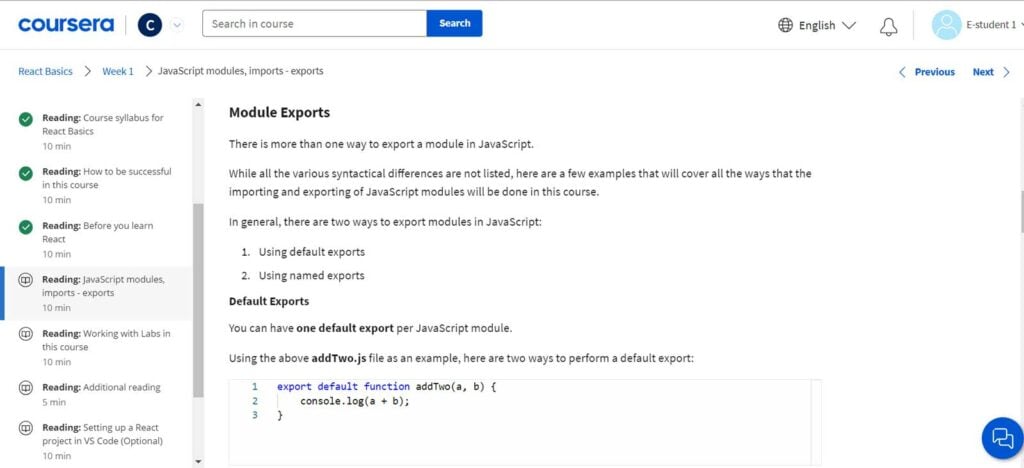
The course’s objectives are clear and achievable, focusing on rendering views where data changes over time, creating scalable and maintainable websites and apps, using props, creating interactive web pages, using forms, and building an application in React. These skills are not only relevant but essential for anyone looking to prepare for a career in mobile development.
Course 10: React Native
The React Native course offers an intriguing exploration into the space of cross-platform mobile application development. As someone who has taken this intermediate-level course, I found it to be both engaging and comprehensive, spanning one to three months and covering everything from the rudiments of React to more intricate implementations using React Native. However, this course is not for the absolute beginner. A foundational knowledge of React basics, internet navigation skills, and a genuine eagerness to code are prerequisites to fully benefit from what the course offers.
The course is divided into five modules, each shedding light on different facets of React Native, an open-source framework that synergizes React’s capabilities with native platform features. What struck me was the clear progression, commencing with fundamental concepts and gradually escalating to more complex techniques. The opportunity to construct a single-page React Native app, manipulate large lists, configure user inputs, and explore various components like the Pressable component for clickable areas was not only stimulating but also mirrored real-world scenarios. The hands-on exercises are thoughtfully designed, providing invaluable experience and exposure to essential tools and software such as React, React Native, front-end development languages (HTML, CSS, and JavaScript), JSX, and code editing programs like Expo and Visual Studio Code. This extensive toolset ensures that learners are well-prepared to tackle diverse aspects of mobile development.
One aspect that particularly resonated with me was the course’s emphasis on cross-platform development. In an industry where the demand for applications that operate seamlessly across various devices is escalating, this focus is not only timely but also sets the course apart, aligning it with contemporary market trends.
The skills imparted range from building a single-page React Native app to using the Pressable component for buttons and other clickable areas. The course also guides you through setting up an app with React Navigation and transitioning between screens. These foundational skills are essential for anyone aspiring to forge a career in mobile development.
Course 11: Full Stack Cloud Development Capstone Project
The iOS App Capstone course is a hands-on exploration of iOS development. Over one to four weeks, this intermediate-level course guides you through three modules to create the “Little Lemon” app. It’s not just theory; you’ll be building a real app, reflecting the scenarios that iOS developers face daily. What makes this course unique is its practical approach. Each module offers a recap of previous courses, with links for detailed review. It’s like having a mentor guiding you through the complex world of iOS development. However, some might find a need for more in-depth guidance on advanced concepts a minor hiccup in an otherwise well-crafted course. Prerequisites include experience in iOS and an understanding of the Swift programming language. By the end, you’ll have a native iOS app ready to publish on the Apple Store.
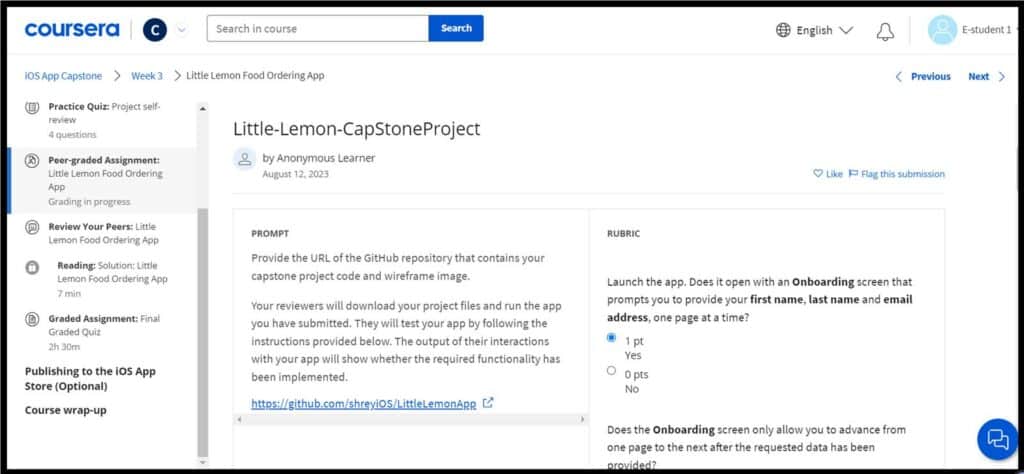
In conclusion, the iOS App Capstone course is more than a learning experience; it’s a stepping stone into the professional world of iOS development. If you’re an intermediate learner looking to showcase your skills, this course could be the launchpad you need. It’s a unique blend of learning and doing that prepares you for a career in iOS development.
Course 12: Coding Interview Preparation
The Coding Interview Preparation course, an intermediate-level offering that spans one to four weeks, is the final course in the “Meta iOS Developer Professional Certificate” program. It’s designed with a clear goal in mind: to prepare learners for the unique and often challenging environment of coding interviews at leading tech companies, including Meta.
Covering four distinct modules, this course goes beyond mere coding exercises, delving into the psychological and strategic aspects of interviewing. What immediately catches the eye is the course’s emphasis on real-world applicability. It’s not just about writing code; it’s about communicating your thought process, visualizing algorithms, and employing successful interviewing strategies. These are skills that are often overlooked but are vital in a high-stakes interview environment. The course’s content is rich and varied, covering everything from the use of pseudocode to the implementation of data structures. The focus on combining new and previously learned coding patterns to solve problems is a refreshing approach, encouraging learners to think creatively and synthesize their knowledge. One of the standout features of this course is its tailored preparation for meta-interviews. This specificity adds a layer of relevance and immediacy to the learning experience, reflecting the demands and expectations of one of the tech industry’s leading companies.
By the end of this course, learners are not just better coders; they are better communicators, strategists, and problem-solvers. They are equipped with a nuanced understanding of computer science fundamentals, data structures, algorithms, and more. But perhaps most importantly, they are prepared to approach coding interviews with confidence and poise.
What do others say?
The course has received positive reviews on Coursera, with many learners praising the comprehensive curriculum and the quality of the instructors. However, some learners have expressed concerns about the pace of the course and the high price point.
On Reddit, learners have shared their experiences with the course, with many appreciating the real-world projects and the depth of the content. On the other hand, some learners felt that the course could have offered more support and interaction.
Conclusion and recommendations
The Meta iOS Developer Professional Certificate is a solid choice for those looking to advance their skills in iOS development. Through mastering essential iOS programming concepts, honing UI design skills, and preparing for technical interviews, this program offers invaluable insights. The added advantage of cross-platform development and exclusive access to the Meta Career Programs Job Board enriches career prospects.
Nevertheless, the course is not without its challenges. The high price point and the fast-paced content may not be suitable for everyone. Therefore, it’s recommended that potential learners consider their learning needs, budget, and time commitment before enrolling in the course.
As a dedicated coding and technology enthusiast, I found this certification to be a transformative investment, equipping me with a competitive edge in the evolving realm of app development. It is highly recommended for anyone aspiring to excel in this dynamic field. Overall, if you’re looking to deepen your understanding of iOS development and gain practical skills, the Meta iOS Developer Professional Certificate is worth considering.
40% ($140 USD) off your first year of Coursera Plus Annual (expires 2 December 2024)



